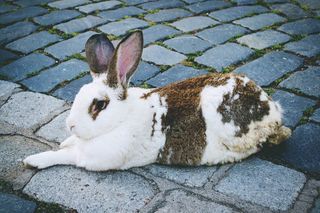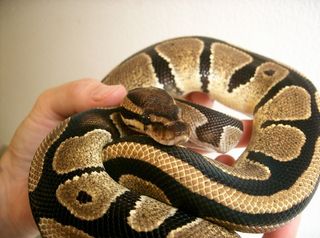Animal Behavior
Animal Magnetism: Can Pets Affect Our Partner Preferences?
A scary snake or fluffy rabbit can change what we desire in a partner.
Posted November 7, 2018

Many of us believe that we have a “type”: that what we prefer in a partner is fixed and permanent. But time and again, research has shown that our desires can vary based on certain variables. Under one set of circumstances, we might find one type of person attractive; under a different set of circumstances, we may find ourselves drawn to another type entirely.
One variable that has a known influence on our preferences is threat. When asked to imagine that we live in a harsh or insecure environment, as opposed to somewhere safe and abundant in opportunities and resources, our “type” is liable to change.
But in most of these studies, the threat or safety is all in the head. Volunteers read descriptions of a particular environment — an apocalyptic hellhole or a Utopian paradise, as the case may be — and researchers checked how this affected the volunteers’ partner preferences.
What if the threat were more genuine?
This is the question Simon Reeve asked himself. Reeve, a psychologist at Oakland University in Michigan, along with his colleagues Justin Mogilski and Lisa Welling, did what any sensible scientist would do in this situation. He got himself a snake. To be precise, a three-foot python.
Now, every experiment needs a control condition. Just as previous researchers had asked their volunteers to imagine a safe as well as a harsh environment, Reeve needed a tame and fluffy companion for his reptilian pet. He chose a rabbit.
The Petting Zoo
Volunteers were ushered into the laboratory or petting zoo and told that they would shortly be invited to handle either the snake or the rabbit. Only one of the animals was present in the room at the time: Half of the volunteers saw the snake, and the other half saw the rabbit. As you can imagine, volunteers who saw the snake were significantly more fearful than volunteers who saw the rabbit.

Reeve took a saliva sample from his volunteers, as part of a cover story about pheromones. In reality, the saliva was never analyzed, and the volunteers never had to handle the snake (phew!) or rabbit (boo!).
Next, the volunteers (all of whom were straight or bisexual) completed a battery of partner preference surveys. They looked at different faces and bodies and chose which they found most attractive.
Reeve found that women preferred men with more developed muscles, more masculine faces, and whose bodies were less fat when in the presence of a snake rather than a rabbit. Men tend not to be attracted to heavily muscled women, but their preferences for female muscularity did increase somewhat when they were in the presence of the snake rather than the rabbit. Previous studies have also suggested that masculine traits are more appealing when we are in a harsh or risky environment, perhaps because a more dominant partner is better able to protect us against threats.
Reeve also found that men are more interested in short-term relationships when in the presence of a snake. Why? Perhaps because when living under threat, we are prone to focus more on reproduction than survival. Organisms from across the animal kingdom are similarly sensitive to threat: Why settle down with one partner and invest all your resources in a single offspring if life is likely to be nasty, brutish, and short? Better to reproduce fast, while your luck holds out.
Interestingly, the psychologists also found that men felt less dominant when confronted with a snake rather than a rabbit. Meanwhile, the snake made women feel less attractive than the rabbit did.
The take-home message is clear: rabbits for everyone.
Facebook image: sashafolly/Shutterstock
References
Reeve, S. D., Mogilski, J. K., & Welling, L. L. M. (in press). Environmental safety threat alters mate choice processes in humans: further evidence for the Environmental Security Hypothesis. Evolutionary Psychological Science.


